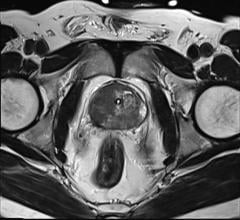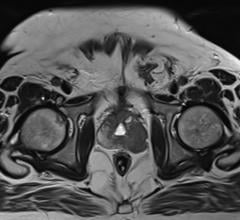
June 20, 2016 — An emerging cancer therapy has colorectal tumors surrounded. Presenters at the 2016 Annual Meeting of the Society of Nuclear Medicine and Molecular Imaging (SNMMI) unveiled a novel radioimmunotherapy that combines a cancer-seeking antibody with potent radionuclide agents, resulting in complete remission of colorectal cancer in mouse models.
Theranostic drugs are powerful newcomers in oncology’s arsenal. In addition to providing targeted treatment, in many cases they double as imaging agents that can monitor the effectiveness of therapy.
An investigative treatment called pretargeted radioimmunotherapy (PRIT) is harnessing an antibody that attaches to the cell-surface antigen glycoprotein A33, which is hyper-expressed in the vast majority of colon cancers, whether primary or metastatic. Researchers united the anti-GPA33 antibody with radionuclide agents that deliver a powerful dose of radiation directly to the tumor. The technique was found to be entirely curative in this preliminary mouse study.
“If these results can be replicated in prospective human studies, this multi-platform approach could be used with an array of antibodies to treat a number of cancers, especially colorectal and ovarian cancers,” said Sarah M. Cheal, Ph.D., the presenting author from Memorial Sloan Kettering Cancer Center, New York, N.Y.
For this study, researchers tested the efficacy of anti-GPA33 with radiotherapies using lutetium-177 benzylDOTA (Lu-177 DOTA-Bn) in mice bearing colorectal cancer grafts. In the same group of animals, the researchers were able to detect solid tumors of 10 milligrams or less during the course of a fractionated treatment regimen that achieved complete cures in all solid tumors without any collateral toxicity. This platform of theranostic radioimmunotherapy could have broad applicability. Cheal estimates that, if validated, these cancer-fighting techniques could be made available in as few as five years.
According to the most current statistics from the American Cancer Society, an estimated 71,830 American men and 65,000 women will be diagnosed with colorectal cancer in 2016. Approximately 26,270 men and 24,040 women are expected to die from the disease.
For more information: www.snmmi.org


 April 17, 2024
April 17, 2024 








